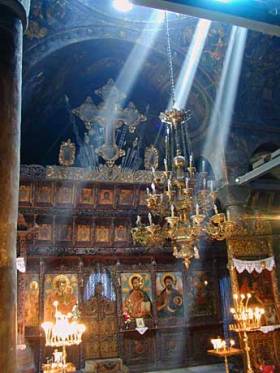
Head office location:
Bulgaria
Elhovo
Headoffice address:
8, Targovska Str., floor 2, Elhovo, Bulgaria
Phones: +359 877777960;
+359 885841230;
+359 887762939
sales@bulgarianestates.org

Bulgarian national feeling began to revive in the early 19th century under the influence of western ideas such as liberalism and nationalism, which trickled into the country after the French revolution, mostly via Greece. The Greek revolt against the Ottomans which began in 1821 (see History of Ottoman Greece), also influenced the small Bulgarian educated class. But Greek influence was limited by the general Bulgarian resentment of Greek control of the Bulgarian Church, and it was the struggle to revive an independent Bulgarian Patriarchate which first roused Bulgarian nationalist sentiment. When some Bulgarians threatened to abandon the Orthodox Church altogether and form a Bulgarian Uniate church loyal to Rome, the Russians intervened with the Sultan. In 1870 the Bulgarian Patriarchate was revived, and the Patriarch became the natural leader of the emerging nation. The Greek Patriarch reacted by excommunicating the Bulgarians, which reinforced their independence.
Another source of the Bulgarian national revival was the Romantic nationalist vision of a people sharing oral traditions and practices. These ideas were stimulated by the work of Johann Gottfried Herder in particular, and were reinforced by Russian Slavophiles and the model Serbian nationalism under the stimulus of scholar-publicists such as Vuk Karadzic. In Bulgaria, the scholar and newspaper editor Lyuben Karavelov played an important role in collecting and publishing oral traditions, and comparing them with the traditions of other Slavic peoples.
In April 1876 the Bulgarians revolted in the so called April Uprising. The uprising was organised by the Bulgarian Revolutionary Central Committee and was inspired by an insurrection in Bosnia the previous year. The revolt was largely confined to the region of Plovdiv, though certain districts in northern Bulgaria, in Macedonia and in the area of Sliven also took part in it. The uprising was crushed with cruelty by the Ottomans who brought irregular Ottoman troops (bashi-bazouks) from outside the area. Altogether some 30,000 people were massacred, the majority of them in the insurgents towns of Batak, Perushtitza and Bratzigovo in the area of Plovdiv. The massacres aroused a broad public reaction led by liberal Europeans such as William Gladstone, who launched a campaign against the "Bulgarian Horrors". The action was supported by a number of European intellectuals and public figures, such as Charles Darwin, Oscar Wilde, Victor Hugo and Giuseppe Garibaldi.
Bulgaria after the Conference of Constantinople, 1876, from "Report of the International Commission To Inquire into the Causes and Conduct of the Balkan Wars, 1914The strongest reaction, however, came from Russia. The enormous public outcry which the April Uprising had caused in Europe gave the Russians a long-waited chance to realise their long-term objectives with regard to the Ottoman Empire. The Russian efforts, which were concentrated on ironing out the differences and contradictions between the Great Powers, eventually led to the Conference of Constantinople held in December 1876 in the Ottoman capital. The conference was attended by delegates from Russia, Britain, France, Austria-Hungary, Germany and Italy and was supposed to bring a peaceful and lasting settlement of the Bulgarian Question.
Russia insisted to the last minute on the inclusion of all Bulgarian-inhabited lands in Macedonia, Moesia, Thrace and Dobrudja in the future Bulgarian state, whereas Britain, afraid that a greater Bulgaria would be a threat to British interests on the Balkans, favoured a smaller Bulgarian principality north of the Balkan Mountains. The delegates eventually gave their consent to a compromise variant, which excluded southern Macedonia and Thrace, and denied Bulgaria access to the Aegean sea, but otherwise incorporated all other regions in the Ottoman Empire inhabited by Bulgarians (illustration, left). In the twelfth hour, however, Turkey rejected the plan with the secret support of England.
Having its reputation at stake, Russia had no other choice but to declare war on the Ottomans in April 1877. The Romanian army and a small contingent of Bulgarian exiles also fought alongside the advancing Russians. The Russians and Romanians were able to inflict a decisive defeat on the Ottomans at Pleven, and, by January 1878 they had occupied much of Bulgaria. They were thus able to dictate terms to the Sultan, and in the Treaty of San Stefano they proposed creating a large Bulgarian state, embracing much of Thrace and Macedonia as well as modern Bulgaria. The Sultan was in no position to resist, but the other powers were not willing to allow the dismemberment of the Ottoman Empire or the creation of a large Russian client state in the Balkans.
Borders of Bulgaria according to the Treaty of San Stefano of March 3rd, 1878As a result, the Treaty of Berlin (1878), under the supervision of Otto von Bismarck of Germany and Benjamin Disraeli of Britain, revised the earlier treaty, and scaled back the proposed Bulgarian state. A Principality of Bulgaria was created, between the Danube and the Stara Planina range, with its seat at the old Bulgarian capital of Veliko Turnovo, and including Sofia. This state was to be under nominal Ottoman sovereignty but was to be ruled by a prince elected by a congress of Bulgarian notables and approved by the Powers. They insisted that the Prince could not be a Russian, but in a compromise Prince Alexander of Battenberg, a nephew of Tsar Alexander II, was chosen.
Between the Stara Planina and the line of the Rhodope Range, which runs about 50km north of the modern border between Bulgaria and Greece, the autonomous province of Eastern Rumelia was created. With its capital at Plovdiv, it was to be under Ottoman sovereignty but governed by a Christian governor appointed by the Sultan with the approval of the Powers. This hybrid territory was governed by Alexander Bogoridi for most of its brief existence.














